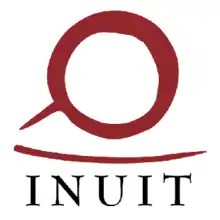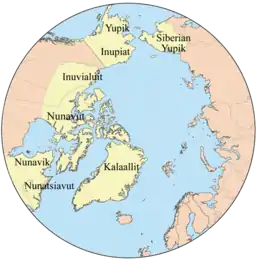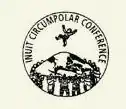Inuit Circumpolar Council
The Inuit Circumpolar Council (ICC) (Greenlandic: Inuit Issittormiut Siunnersuisooqatigiiffiat), formerly Inuit Circumpolar Conference, is a multinational non-governmental organization (NGO) and indigenous peoples' organization (IPO) representing the 180,000 Inuit, Yupik, and Chukchi peoples (often referred to as Eskimo) living in Alaska (United States), Canada, Greenland (Kingdom of Denmark), and Chukotka (Russia). ICC was ECOSOC-accredited and was granted special consultative status (category II) at the UN in 1983.
Inuit Circumpolar Council
| |
 The logo of the Inuit Circumpolar Council Stylised motif of a frame drum with a handle and a stick | |
 Member states and regions of the Inuit Circumpolar Council. | |
| Abbreviation | ICC |
|---|---|
| Formation | June 1980 |
| Founded at | Nuuk, Greenland |
| Type | Inter- and multinational non-governmental organization (NGO) |
| Legal status | active |
| Purpose | To promote and to ensure rights, interests, and the development of Inuit culture and languages. |
| Headquarters | Alaska Anchorage Canada Ottawa Greenland Nuuk Russia Anadyr |
Region served | |
Membership | 180,000 Inuit |
Official languages | |
Chair of the Inuit Circumpolar Council | Dr. Dalee Sambo Dorough |
Vice-Chairs of the Inuit Circumpolar Council | President of ICC Alaska James Stotts President of ICC Canada Nancy Karetak-Lindell President of ICC Greenland Hjalmar Dahl President of ICC Russia Tatiana Achirgina |
Main organ | ICC International |
| Website | ICC Alaska ICC Canada ICC Greenland ICC Chukotka |
| Part of a series on |
| Indigenous rights |
|---|
| Rights |
| Governmental organizations |
| NGOs and political groups |
| Issues |
| Legal representation |
| Category |

The Conference, which first met in June 1977 in Barrow, Alaska, initially represented Native Peoples from Canada, Alaska and Greenland. In 1980 the charter and by-laws of ICC were adopted. The Conference agreed to replace the term Eskimo with the term Inuit. This has not however met with widespread acceptance by some groups, most pre-eminently the Yupik (see Background section below). The principal goals of the ICC are to strengthen unity among Inuit of the circumpolar region; to promote Inuit rights and interests on an international level; to develop and encourage long-term policies that safeguard the Arctic environment; and to seek full and active partnership in the political, economic, and social development of circumpolar regions.,[1] or in short: to strengthen ties between Arctic peoples and to promote human, cultural, political and environmental rights and polities at the international level.[2]
ICC holds a General Assembly every four years. ICC is one of the six Arctic indigenous peoples to have the status of Permanent Participant on the Arctic Council.
Background
The Inuit population includes the following groups and regions:
- Canada: Nunavut, the Inuvialuit (Northwest Territories), Nunavik (Northern Quebec), and Nunatsiavut (Labrador)
- Greenland: the Kalaallit, Inughuit and Tunumiit
- Russia (Chukchi Peninsula): the Chukchi people and Siberian Yupik
- United States (Alaska): the Iñupiat and Yupik
All of these peoples are sometimes collectively referred to be the exonym Eskimo, the use of which is frowned upon by many of the Inuit, especially in eastern Canada and Greenland. ICC uses the term Inuit to refer to them all, which has its own problems. One of those problems is administrative: an Inuk in the United States could be considered "Native American", "Alaskan Native" or "Aboriginal American". The Yupik of both Alaska and Russia generally dislike being called Inuit, which is not a word in the Yupik language nor a word which they use to describe themselves, and prefer Yupik but will tolerate Eskimo.[3]
Structure and functions
The main goals of the organization are to strengthen unity among Inuit, to promote their rights and interests, and to ensure the development of Inuit culture. Structurally, the organization is made up of four separate offices in each of the four Inuit nations, chartered individually under their national rules. The Presidents of ICC Chukotka, ICC Alaska, ICC Canada, and ICC Greenland, along with one Executive Council Member elected from each of the nations, make up the eight-member ICC Executive Council. The Executive Council is presided over by an International Chair (formerly international president - the title was changed in 2002).
ICC holds a General Assembly every four years, bringing together Inuit from across the northern circumpolar region to discuss issues of international importance to their communities, provide direction for the work of the organization over the next four years, and divide responsibility for issue areas between the national offices. Assembly delegates appoint an international Chair from the General Assembly host-country, along with the members of Executive Council, and develop policies and resolutions for the coming term.
The General Assembly, and thus the international Chair position, rotates between the four Inuit nations quadrennially at the General Assemblies. At the 2002 General Assembly in Kuujjuaq, Nunavik, Canada, the Chair passed from Greenland, where it had been held for the previous seven years by Aqqaluk Lynge, now a member of the United Nations Permanent Forum on Indigenous Issues, to Canada, where Sheila Watt-Cloutier, formerly the President of ICC Canada, took the position.
In 2006, the Chair passed to ICC Alaska at the General Assembly in Barrow, (now Utqiaġvik) and was then occupied by Patricia L. Cochran, formerly Executive Director of the Alaska Native Science Commission. At that Assembly, ICC also voted to change its name to Inuit Circumpolar Council as there has been perennial confusion over an organizational name that sounds more like a past meeting.
For the 2010–2014 term, Aqqaluk Lynge served as Chair. For the 2014–2018 term, Okalik Eegeesiak served as Chair. For the 2018–2022 term, Dalee Sambo Dorough is serving as Chair.
The Chair of the Inuit Circumpolar Youth Council (2007-2010) was Greta Schuerch of Alaska.
See also
- International initiatives
- Saami Council
- Nordic Council
- West Nordic Council
- Arctic cooperation and politics
- International Day of the World's Indigenous Peoples
- Working Group on Indigenous Populations
- Indigenous rights
- Linguistic rights
- Indigenous and Tribal Populations Convention, 1957
- Indigenous and Tribal Peoples Convention, 1989
- Declaration on the Rights of Indigenous Peoples
- Individuals of influence
References
- Pound, Richard W. (2005). 'Fitzhenry and Whiteside Book of Canadian Facts and Dates'. Fitzhenry and Whiteside.
- Inuit or Eskimo: Which names to use?
External links
| Wikimedia Commons has media related to Inuit Circumpolar Council. |